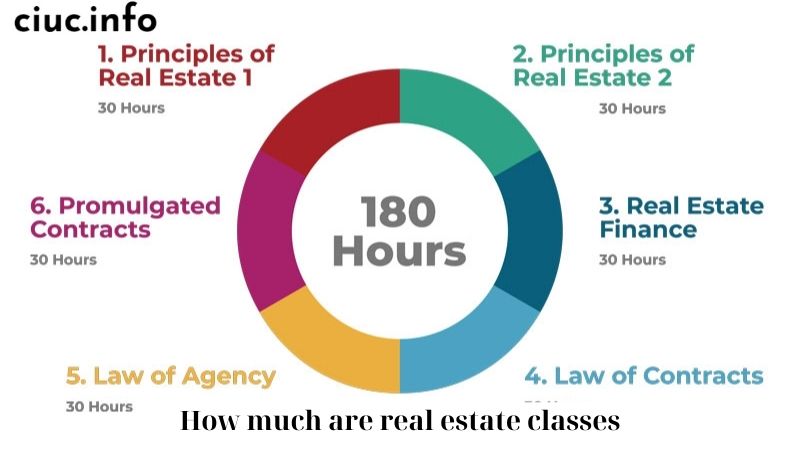How Much Are Real Estate Classes? Real estate is a dynamic and lucrative industry, offering abundant opportunities for those equipped with the right knowledge and skills. As the market evolves, so does the necessity for comprehensive education in real estate. Whether you’re aspiring to be a real estate agent or seeking advanced certifications, understanding the costs associated with real estate classes is crucial. This article, ciuc.info delves into How Much Are Real Estate Classes, the factors influencing their costs, and tips for finding affordable options.
Types of Real Estate Classes

Pre-licensing Courses
Pre-licensing courses are the first step for anyone looking to enter the real estate field. These courses are mandatory and vary by state, typically covering essential topics like real estate principles, practices, law, and ethics. The format of these courses can be online or in-person, with each offering distinct advantages. Online courses provide flexibility and convenience, allowing students to study at their own pace. In-person classes, on the other hand, offer interactive learning experiences and direct access to instructors.
Post-licensing Courses
Once you’ve obtained your real estate license, most states require you to complete post-licensing education to maintain it. These courses are designed to further your knowledge and skills, ensuring you stay current with industry trends and legal updates. Post-licensing education often includes continuing education (CE) requirements, which vary by state. Additionally, there are specialized courses available that focus on niche areas within real estate, such as commercial real estate, property management, and real estate investment.
Certification Programs
For those looking to advance their careers, certification programs offer a path to specialized knowledge and higher earning potential. Broker certification is one of the most common advanced designations, allowing agents to operate their own real estate businesses. Other notable certifications include the Certified Residential Specialist (CRS) and the Graduate, REALTOR® Institute (GRI). These programs typically require additional coursework and exams, but they can significantly enhance your credibility and expertise in the field.
How Much Are Real Estate Classes? Cost Factors for Real Estate Classes

Several factors influence the cost of real estate classes, including geographic location, type of institution, course format, and duration.
Geographic Location
The cost of real estate education can vary significantly depending on where you live. Urban areas with a high cost of living generally have higher tuition fees than rural areas. Additionally, some states have more stringent licensing requirements, which can increase the cost of education.
Type of Institution
The institution offering the course also plays a significant role in determining its cost. Community colleges and universities often offer real estate courses at competitive rates, especially for in-state residents. Private real estate schools and online platforms may charge higher fees but often provide more specialized and flexible learning options.
Format of the Course
Whether a course is offered online, in-person, or as a hybrid of both can impact its cost. Online courses tend to be more affordable due to lower overhead costs. They also offer greater flexibility, which can be a significant advantage for working professionals. In-person classes, while typically more expensive, provide opportunities for networking and direct interaction with instructors and peers.
Duration and Intensity of the Course
The length and depth of the course content also affect the overall cost. Intensive courses that cover a lot of material in a short period tend to be more expensive. However, they may be more cost-effective in the long run if they allow you to enter the workforce sooner or complete required education quickly.
How Much Are Real Estate Classes?
Pre-licensing Courses
The cost of pre-licensing courses can vary widely. Online pre-licensing courses typically range from $200 to $800, depending on the provider and state requirements. In-person pre-licensing courses usually cost between $300 and $1,000, reflecting the additional resources and facilities required for classroom instruction.
Post-licensing Courses
Continuing education classes, which fall under post-licensing requirements, generally cost between $50 and $300 per course. Specialized training programs, such as those focusing on commercial real estate or property management, can be more expensive, ranging from $200 to $1,000.
Certification Programs
Certification programs, such as broker certification or advanced designations like CRS and GRI, often have higher costs due to their specialized nature. Broker certification courses typically range from $500 to $2,000. Additional designations can cost anywhere from $300 to $1,500, depending on the number of required courses and exam fees.
Tips for Choosing Affordable Real Estate Classes

Research and Compare Multiple Providers
Take the time to research and compare various course providers. Look for reviews, success rates, and accreditation to ensure you choose a reputable institution.
Look for Bundled Packages and Discounts
Some providers offer bundled packages that include pre-licensing, post-licensing, and exam preparation courses at a discounted rate. Keep an eye out for promotions and discounts, which can significantly reduce costs.
Consider Online Courses for Flexibility and Cost Savings
Online courses can offer significant cost savings and greater flexibility, making them an excellent option for those balancing work and study. Ensure the online provider is accredited and meets state requirements.
Conclusion
Investing in real estate education is a crucial step for anyone looking to succeed in this competitive industry. Understanding the various types of courses available, the factors that influence their costs, and the potential for financial aid can help you make informed decisions. While the initial investment may be substantial, the long-term benefits of a successful real estate career can far outweigh these costs. By carefully researching and selecting the right educational path, you can ensure a solid foundation for a prosperous future in real estate.
